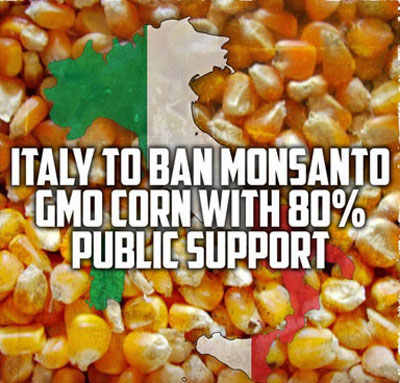|
by Natasha Longo July 23, 2013 from PreventDisease Website
Three Italian ministries have signed a
decree banning the cultivation of Monsanto's genetically modified
corn, citing environmental concerns, the agriculture ministry said
last week.
Earlier this year, Poland had become the eighth EU member state to ban the cultivation of genetically modified (GM) crops.
Seven other EU member states have already imposed bans on the cultivation of GM crops approved by the European Food Safety Authority (EFSA) as safe:
Now Italy has joined the ranks.
The ban was also signed off by the health and environment ministries, with the agriculture ministry citing the crop's "negative impact on biodiversity".
The ministry said it had already notified the European Commission and other states in the European Union of the move.
While GMO cultivation approvals are agreed jointly at the EU level, individual governments can introduce safeguards if they believe that cultivation could present a health or environmental risk. Those moves, however, are always verified by the Commission.
France put in place a similar temporary
ban on GMO crops last year.
In Spain, dozens of people have destroyed GMO fields.
In an anonymous press release that year, they wrote,
Europe is quickly becoming the most progressive continent in the world to oppose GM foods.
...have all declared many regions to be GMO-free.
France made an important step in the no-GMO movement by specifically defining exactly what "GMO-free" means when it comes to food labeling.
Spain and Portugal are slowing advancing but they have a long way to go before declaring most of their regions GMO-free. Britain officially supports GM crops and has trials of GMOs like potatoes planted.
...are now completely GMO-free zones
thanks to public and government support.
Nearly 80 percent of Italians are in support of a ban, according to Italy's biggest farmers group Coldiretti, citing the results of a recent survey.
The Italian ban will be valid for a period of up to 18 months, the ministry added.
Five EU member states grew MON810 maize on 129,000 hectares in 2012, data from the International Service for the Acquisition of Agri-biotech Applications showed.
Spain was the top producer,
followed by Portugal, the Czech Republic, Slovakia and Romania.
|

